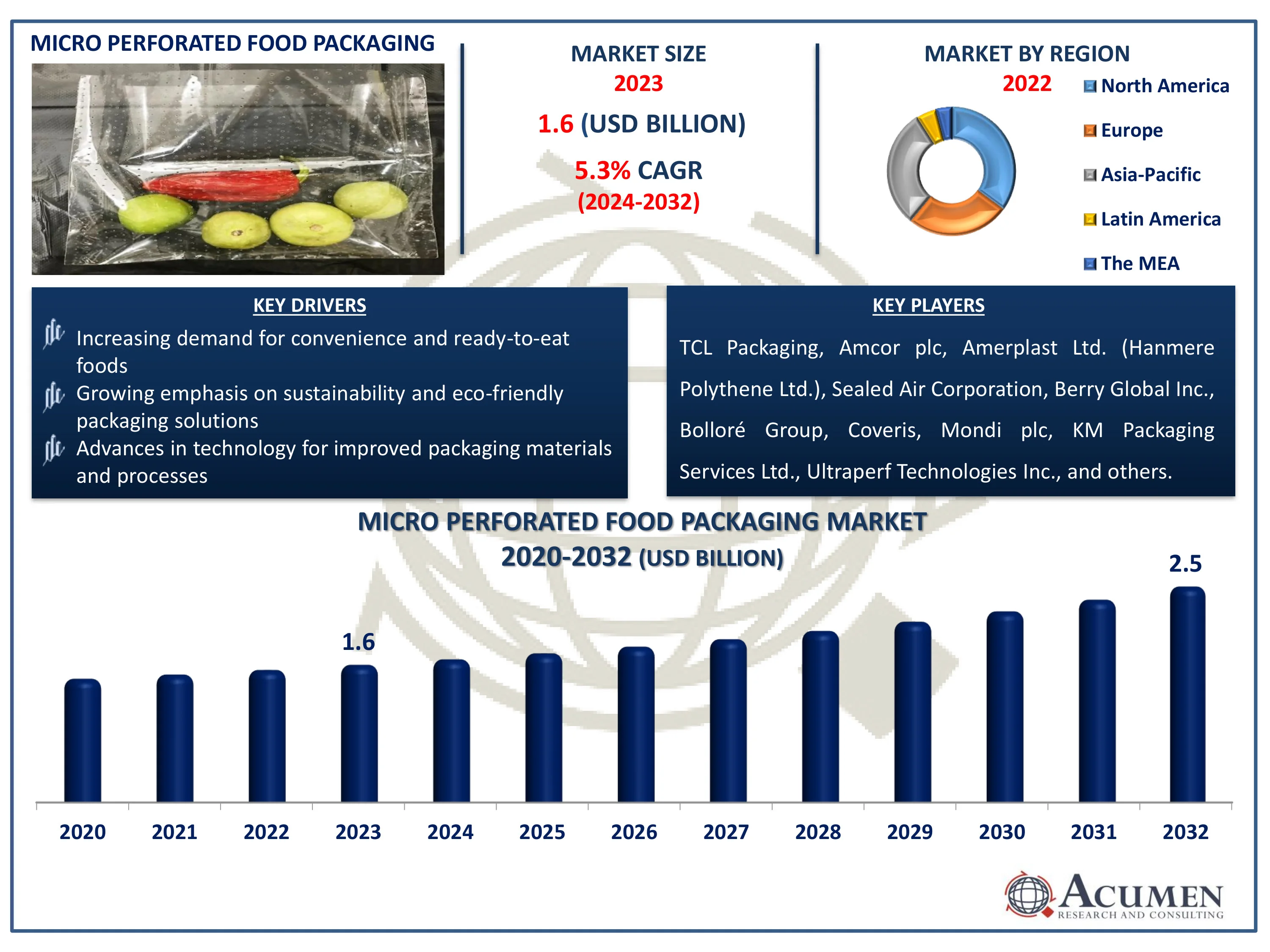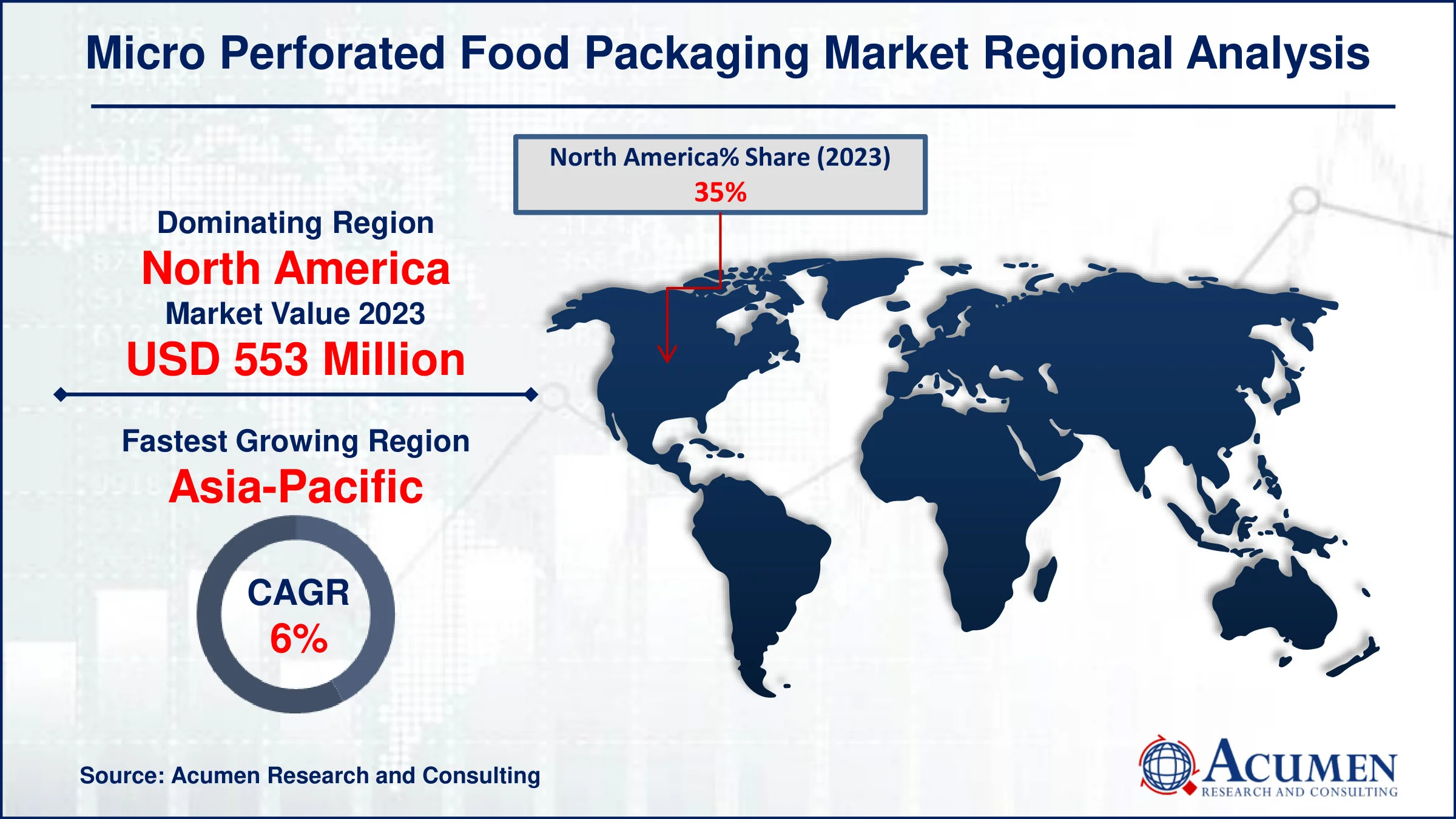Micro Perforated Food Packaging Market Size - Global Industry, Share, Analysis, Trends and Forecast 2024 - 2032
Published :
Report ID:
Pages :
Format :
Micro Perforated Food Packaging Market Size - Global Industry, Share, Analysis, Trends and Forecast 2024 - 2032
Report Coverage
- Industry Dynamics
- Market Size and Forecast Data
- Segment Analysis
- Competitive Landscape
- Regional Analysis with a Niche Focus on Country-Level Data
- High Level Analysis - Porter's, PESTEL, Value Chain, etc.
- Company Profiles of Key Players
- Option to Customize the Report As Per Your Specific Need
Request Sample Report
The Micro Perforated Food Packaging Market Size accounted for USD 1.6 Billion in 2023 and is estimated to achieve a market size of USD 2.5 Billion by 2032 growing at a CAGR of 5.3% from 2024 to 2032.
Micro Perforated Food Packaging Market Highlights
- Global micro perforated food packaging market revenue is poised to garner USD 2.5 billion by 2032 with a CAGR of 5.3% from 2024 to 2032
- North America micro perforated food packaging market value occupied around USD 553 million in 2023
- Asia-Pacific micro perforated food packaging market growth will record a CAGR of more than 6% from 2024 to 2032
- Based on material, the polyethylene sub-segment generated 50% market share in 2023
- Based on application, the Fruits & vegetables sub-segment shows 45% share in 2023
- Increasing demand for biodegradable micro-perforated food packaging materials to reduce environmental impact is the micro perforated food packaging market trend that fuels the industry demand

Micro perforated food packaging involves the use of tiny holes or perforations in packaging materials like films or bags. These perforations are strategically designed to allow for controlled airflow and moisture exchange between the packaged food and its environment. This technology helps in extending the shelf life of fresh produce by maintaining optimal levels of oxygen and carbon dioxide within the package. It also prevents the buildup of condensation, which can lead to microbial growth and spoilage. Micro perforations are carefully engineered to balance the needs of freshness and protection, making them a popular choice for unpreserved food items in the retail and food service industries.
Global Micro Perforated Food Packaging Market Dynamics
Market Drivers
- Increasing demand for convenience and ready-to-eat foods
- Growing emphasis on sustainability and eco-friendly packaging solutions
- Advances in technology for improved packaging materials and processes
Market Restraints
- Stringent regulatory requirements and compliance issues
- Concerns over the impact of packaging waste on the environment
- High initial investment and operational costs
Market Opportunities
- Rising consumer awareness regarding food safety and hygiene
- Expansion of the food retail sector, particularly in emerging markets
- Innovations in active and intelligent packaging solutions
Micro Perforated Food Packaging Market Report Coverage
| Market | Micro Perforated Food Packaging Market |
| Micro Perforated Food Packaging Market Size 2022 | USD 1.6 Billion |
| Micro Perforated Food Packaging Market Forecast 2032 | USD 2.5 Billion |
| Micro Perforated Food Packaging Market CAGR During 2023 - 2032 | 5.3% |
| Micro Perforated Food Packaging Market Analysis Period | 2020 - 2032 |
| Micro Perforated Food Packaging Market Base Year |
2022 |
| Micro Perforated Food Packaging Market Forecast Data | 2023 - 2032 |
| Segments Covered | By Material, By Application, And By Geography |
| Regional Scope | North America, Europe, Asia Pacific, Latin America, and Middle East & Africa |
| Key Companies Profiled | TCL Packaging, Amcor plc, Amerplast Ltd. (Hanmere Polythene Ltd.), Sealed Air Corporation, Berry Global Inc., Bolloré Group, Coveris, Mondi plc, KM Packaging Services Ltd., Ultraperf Technologies Inc., SRF Limited, and UFlex Limited. |
| Report Coverage |
Market Trends, Drivers, Restraints, Competitive Analysis, Player Profiling, Covid-19 Analysis, Regulation Analysis |
Micro Perforated Food Packaging Market Insights
The micro perforated food packaging market is experiencing a surge in demand due to increasing emphasis on sustainability and eco-friendly solutions. These packages allow for enhanced breathability, extending shelf life while reducing food waste. Consumers and regulatory bodies alike are pushing for packaging innovations that minimize environmental impact, driving manufacturers to adopt these technologies. This trend reflects a broader shift towards sustainable practices across the food industry, where packaging plays a crucial role in meeting both consumer expectations and regulatory requirements for eco-friendly solutions. As such, the market for micro perforated food packaging is poised for continued growth as businesses seek to align with sustainable development goals.
The micro perforated food packaging market faces growing scrutiny due to concerns over its environmental impact from packaging waste. As consumers and regulatory bodies increasingly prioritize sustainability, there's heightened pressure on industries to reduce packaging waste. Micro perforated packaging, while offering benefits like freshness preservation, often involves materials that contribute to environmental degradation when disposed of improperly. This problem restrains market growth as companies seek alternatives that balance functionality with reduced environmental footprint. Innovations in biodegradable materials and recycling solutions are pivotal in addressing these concerns and shaping the future of sustainable packaging solutions.
Rising consumer awareness about food safety and hygiene has significantly influenced the micro perforated food packaging market. For instance, according to American Farm Bureau Federation, American farmers and ranchers are dedicated to ensuring the production of safe and affordable food for consumers in both the United States and globally. Consumers are increasingly concerned about the freshness and quality of packaged food products, driving demand for packaging solutions that enhance shelf life while maintaining product integrity. Micro perforated packaging allows for controlled gas exchange, preserving freshness by regulating oxygen and carbon dioxide levels inside the package. This technology not only extends shelf life but also reduces food waste, aligning with sustainability goals. As consumer preferences shift towards convenient, fresh, and safe food options, the micro perforated food packaging market is poised for growth, driven by its ability to meet these evolving demands effectively.
Micro Perforated Food Packaging Market Segmentation
The worldwide market for micro perforated food packaging is split based on material, application, and geography.
Micro Perforated Food Packaging Materials
- Polyethylene
- Polypropylene
- PET
- Others
According to the micro perforated food packaging industry analysis, polyethylene dominates the micro perforated food packaging market due to its versatility, affordability, and ease of processing. This material offers excellent barrier properties against moisture and gases, crucial for extending the shelf life of perishable foods. Its flexibility allows for precise micro-perforation techniques, which are essential for regulating airflow and maintaining product freshness. Additionally, polyethylene's compatibility with various printing and labeling methods makes it a preferred choice for branding and consumer information on food packaging.
Micro Perforated Food Packaging Applications
- Fruits & Vegetables
- Bakery & Confectionery
- Ready-To-Eat
- Others
According to the micro perforated food packaging market forecast, fruits and vegetables, is expected to dominate the market due to its ability to extend shelf life by regulating gas exchange. These packages feature tiny holes that maintain optimal oxygen and carbon dioxide levels, slowing down ripening and preserving freshness. This technology ensures produce remains crisp and flavorful longer, meeting consumer demand for quality and reducing food waste throughout the supply chain. As sustainability gains prominence, micro perforated packaging offers a balance of preservation and eco-consciousness, making it a preferred choice in the food industry.
Micro Perforated Food Packaging Market Regional Outlook
North America
- U.S.
- Canada
Europe
- U.K.
- Germany
- France
- Spain
- Rest of Europe
Asia-Pacific
- India
- Japan
- China
- Australia
- South Korea
- Rest of Asia-Pacific
Latin America
- Brazil
- Mexico
- Rest of Latin America
The Middle East & Africa
- South Africa
- GCC Countries
- Rest of the Middle East & Africa (ME&A)

Micro Perforated Food Packaging Market Regional Analysis
For several reasons, in North America, the micro perforated food packaging market holds a dominant position due to several key factors. The regions advanced food processing industry demands high-quality packaging solutions that extend shelf life and maintain food freshness. For instance, the U.S. Federal Food, Drug, and Cosmetic Act (FD&C Act) mandates that packaging materials must be safe and free from any chemical impact when in contact with food products. Additionally, every food packaging manufacturer in the U.S. must conduct an Environmental Assessment (EA) and obtain clearance from the FDA (United States Food and Drug Administration). Additionally, stringent regulatory standards encourage the adoption of innovative packaging technologies like micro perforation, which allows for optimal gas exchange to preserve food quality. Moreover, North America's strong consumer preference for convenience and sustainable packaging further drives the market growth, fostering continuous innovation in food packaging solutions.
Asia-Pacific is fastest-growing region in micro perforated food packaging market. This region's stringent regulations promoting food safety and preservation also contribute to the market's growth, as micro perforated packaging helps extend shelf life while maintaining product freshness.
Europe has emerged as the fastest-growing region due to several key factors. Presence of key players in European country and their collaboration boosting market growth. For instance, in January 2023, Mondi plc ('Mondi') acquired the Burgo Group's Duino mill near Trieste, Italy, for a total sum of US$42.95 million. Furthermore, innovations in packaging materials and technologies within Europe continue to enhance the market's dynamics, catering to the evolving needs of both consumers and producers in the food industry.
Micro Perforated Food Packaging Market Players
Some of the top micro perforated food packaging companies offered in our report include TCL Packaging, Amcor plc, Amerplast Ltd. (Hanmere Polythene Ltd.), Sealed Air Corporation, Berry Global Inc., Bolloré Group, Coveris, Mondi plc, KM Packaging Services Ltd., Ultraperf Technologies Inc., SRF Limited, and UFlex Limited.
Frequently Asked Questions
How big is the micro perforated food packaging market?
The micro perforated food packaging market size was valued at USD 1.6 billion in 2023.
What is the CAGR of the global micro perforated food packaging market from 2024 to 2032?
The CAGR of micro perforated food packaging is 5.3% during the analysis period of 2024 to 2032.
Which are the key players in the micro perforated food packaging market?
The key players operating in the global market are including TCL Packaging, Amcor plc, Amerplast Ltd. (Hanmere Polythene Ltd.), Sealed Air Corporation, Berry Global Inc., Bolloré Group, Coveris, Mondi plc, KM Packaging Services Ltd., Ultraperf Technologies Inc., SRF Limited, and UFlex Limited
Which region dominated the global micro perforated food packaging market share?
North America held the dominating position in micro perforated food packaging industry during the analysis period of 2024 to 2032.
Which region registered fastest CAGR from 2024 to 2032?
Asia-Pacific region exhibited fastest growing CAGR for market of micro perforated food packaging during the analysis period of 2024 to 2032.
What are the current trends and dynamics in the global micro perforated food packaging industry?
The current trends and dynamics in the micro perforated food packaging industry include increasing demand for convenience and ready-to-eat foods, growing emphasis on sustainability and eco-friendly packaging solutions, and advances in technology for improved packaging materials and processes
Which material held the maximum share in 2023?
The polyethylene expected to hold the maximum share of the micro perforated food packaging industry.


